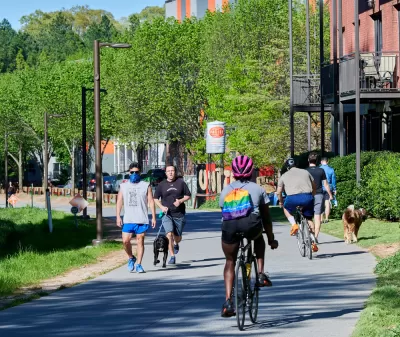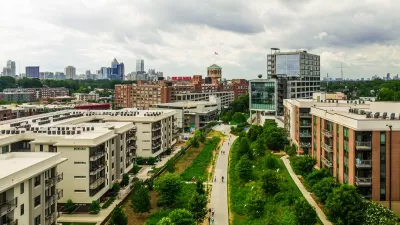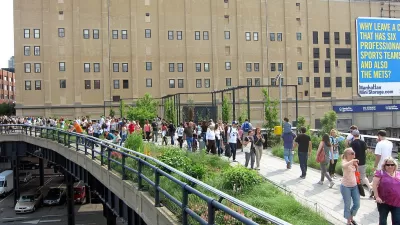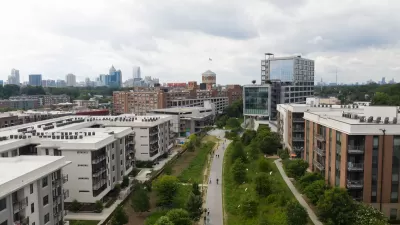For one author, the key is focusing on affordable housing from the start.

Writing in The Conversation, author of Red Hot City: Housing, Race, and Exclusion in Twenty-First Century Atlanta Dan Immergluck describes how “planning and policy decisions [in Atlanta] have promoted a heavily racialized version of gentrification that has excluded lower-income, predominantly Black residents from sharing in the city’s growth.”
In particular, Immergluck faults the Atlanta BeltLine multiuse trail, a repurposed former railway corridor that has in some ways revitalized the surrounding area at the expense of low-income households who were pushed out. Immergluck calls this “green gentrification” that occurs when new green spaces and park facilities lead to higher housing costs and displacement. “If cities fail to prepare for these effects, gentrification and displacement can transform lower-income neighborhoods into areas of concentrated affluence rather than thriving, diverse communities.”
The BeltLine, first proposed in the early 2000s, became a transformative project for Atlanta. In 2007, Immergluck found that property values near the BeltLine were indeed going up faster than in other areas. “This meant that property taxes rose for many lower-income homeowners, and landlords of rental properties were likely to raise rents in response.”
As the article explains, “Rather than focusing on securing land for affordable housing when values were low, Atlanta BeltLine, Inc. prioritized building trails and parks.” Pledges to support affordable housing went unfulfilled. “In 2017 the Atlanta Journal-Constitution ran a high-profile investigative series documenting that the BeltLine had produced just 600 units of affordable housing in 11 years – far off the pace required to meet its target of 5,600 by 2030.”
For Immergluck, the lesson for other cities and developments is clear. “In my view, the most important takeaway is the importance of front-loading affordable housing efforts in connection with major redevelopment projects.” He also suggests limiting property tax increases for low-income homeowners and giving tax breaks to landlords who keep rental housing units affordable.

Alabama: Trump Terminates Settlements for Black Communities Harmed By Raw Sewage
Trump deemed the landmark civil rights agreement “illegal DEI and environmental justice policy.”

Planetizen Federal Action Tracker
A weekly monitor of how Trump’s orders and actions are impacting planners and planning in America.

How Atlanta Built 7,000 Housing Units in 3 Years
The city’s comprehensive, neighborhood-focused housing strategy focuses on identifying properties and land that can be repurposed for housing and encouraging development in underserved neighborhoods.

In Both Crashes and Crime, Public Transportation is Far Safer than Driving
Contrary to popular assumptions, public transportation has far lower crash and crime rates than automobile travel. For safer communities, improve and encourage transit travel.

Report: Zoning Reforms Should Complement Nashville’s Ambitious Transit Plan
Without reform, restrictive zoning codes will limit the impact of the city’s planned transit expansion and could exclude some of the residents who depend on transit the most.

Judge Orders Release of Frozen IRA, IIJA Funding
The decision is a victory for environmental groups who charged that freezing funds for critical infrastructure and disaster response programs caused “real and irreparable harm” to communities.
Urban Design for Planners 1: Software Tools
This six-course series explores essential urban design concepts using open source software and equips planners with the tools they need to participate fully in the urban design process.
Planning for Universal Design
Learn the tools for implementing Universal Design in planning regulations.
Jessamine County Fiscal Court
Caltrans
Institute for Housing and Urban Development Studies (IHS)
City of Grandview
Harvard GSD Executive Education
Toledo-Lucas County Plan Commissions
Salt Lake City
NYU Wagner Graduate School of Public Service





























